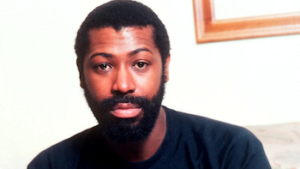
Teddy Pendergrass
*Teddy Pendergrass was born on this date in 1950. He was a Black singer and entertainer.
Theodore DeReese Pendergrass Jr. was born in Kingstree, S.C., and moved to Philadelphia as an infant with his mother, Ida Pendergrass. Growing up in North Philadelphia, Pendergrass was steeped in gospel and soul music. He was two years old when he first stood on a chair to sing at a storefront Holiness church. With his mother’s encouragement, he often attended church seven days a week. But he was also drawn to the Uptown Theater, which presented top performers on the R&B tour. When he was a teenager, his mother gave him a set of drums, and he taught himself to play them.
Pendergrass dropped out of high school to become a musician, working with R&B and doo-wop groups. In 1969, he joined Harold Melvin and the Blue Notes, a vocal group working in Philadelphia since the mid-1950s. He soon moved from the drums to lead vocals. Kenneth Gamble and Leon A. Huff, a Black songwriting and production team, had noticed Pendergrass while preparing for a Blue Notes recording session as the band’s drummer.
Signed to Philadelphia International, Harold Melvin and the Blue Notes had a string of hits in the ’70s with Pendergrass singing lead, including “If You Don’t Know Me by Now” in 1972, “The Love I Lost” in 1973 and “Bad Luck” and “Wake Up Everybody,” both in 1975. However, there was increasing friction between Pendergrass and Melvin, and in 1975, Pendergrass left the group. By the late ’70s, Pendergrass’s concerts, some of them presented for women only, drew screaming, ecstatic crowds. Women would fling teddy bears and lingerie onstage.
Gamble called Pendergrass “the black Elvis.” Pendergrass was a hitmaker for a decade. On March 18, 1982, on a winding road in the Germantown section of Philadelphia, Pendergrass’s Rolls-Royce smashed into a highway divider and a tree because of either brake failure or a faulty electrical system that had turned off the power steering. Spinal cord injuries left him paralyzed from the chest down at 31.
After extensive physical therapy, he resumed his recording career and had Top 10 rhythm and blues hits and gold albums into the ’90s. His voice was less forceful but still recognizable, as he substituted nuance for lung power. Though he could no longer tour, a worldwide television audience saw him sing at the Live Aid concert in Philadelphia in 1985, and he occasionally returned to the stage in the 1990s and 2000s.
Teddy Pendergrass, the Philadelphia soul singer whose husky, potent baritone was one definition of R&B seduction in the 1970s but whose career was transformed in 1982 when he was severely paralyzed in an auto accident, died on January 13, 2010, in Bryn Mawr, Pa. He was 59. His mother and wife, Joan; his children, Teddy Pendergrass II, Trisha Pendergrass, and La Donna Pendergrass; and four grandchildren survived him.
All Media Guide
1168 Oak Valley Drive
Ann Arbor, MI 48108 USA